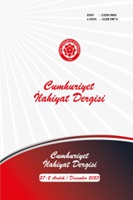Dinî Kimliğin Oluşumunda Çocukluk Döneminin Etkisi: Rol Teorisi Bağlamında Psikolojik Bir Analiz
The Effect of Childhood on the Formation of Religious Identity: A Psychological Analysis on the Context of Role Theory
Author(s): Şerife Ericek Maraşlıoğlu, Saffet KartopuSubject(s): Social psychology and group interaction, Developmental Psychology, Sociology of Religion, History of Religion, Psychology of Religion
Published by: Cumhuriyet Üniversitesi İlahyat Fakültesi
Keywords: Psychology of Religion; Experience; Religiosity; Childhood; Identity; Role Theory;
Summary/Abstract: A human who open their eyes to life finds themselves within a religious tradition and culture. They encounter religious objects and places, meets religious people and live in communication with them. They learn about religion from their family and their surroundings; they see people who perform their religious worship, and from time to time, they themselves participate in these worships. They ask questions, do research, and turn to the use of religious words and concepts. Childhood period has a significant impact on the formation of religious belief, attitudes and behaviours in adulthood, in other words, on the construction of religious identity. The study examined the origins of individual and collective religious identity, religious experiences from childhood to adulthood and cultural contexts. Thus, it was investigated that how participants constructed their religious identities by making sense of the reference frameworks that they acquired from religious narratives and traditions. In this context, the factors that shape and define the construction of religious identity have been analysed in two dimensions, theoretical and field research. 60 participants aged 25 to 75 living in Kahramanmaraş were interviewed in between 2021 and 2022. The study analysed findings about how adult religious individuals build their religious identities using phenomenological patterns from qualitative data collection methods. In the study, the participants were selected with the purposeful sampling method identified with the phenomenological pattern and the study conducted 40-160 minutes of face-to-face in-depth interviews with semi- structured questions prepared separately for 5 main and 13 sub-categories. The data obtained was analysed and categorised using the MAXQDA 12 package program. At this point in our research, the question of what are the factors that influence the formation and maintenance of a person’s religious identity is sought in the framework of the research findings. According to the findings obtained as a result of the study which is based on the basic approaches of role theory it has been observed that the family factor is prominent in building an individual’s religious identity. In addition to the influence of parents on family members in shaping religious identity, it has been observed that some participants are influenced by extended family members such as grandparents. On the other hand, it has been found that schools and courses attended under the referral of the family or the society, the religious officials and religious groups met, and media programmes followed are factors that influence the building of the individual’s religious identity after the family. It has been determined that religious texts and folkloric elements provide stereotyped roles in making choices such as the style of clothing eating and drinking, which are symbolically reflected in the individual’s life, in the implementation of religious orders and moral principles, in short, the construction of religious identity.
Journal: Cumhuriyet İlahiyat Dergisi
- Issue Year: 27/2023
- Issue No: 2
- Page Range: 684-705
- Page Count: 22
- Language: Turkish

